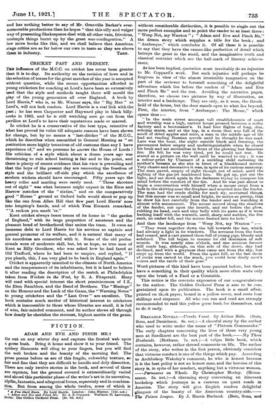CRICKET PAST AND PRESENT.
Tan influence of the M.C.C. on cricket has never been greater than it is to-day. Its authority on the revision of laws and in the selection of teams for the great matches of the year is accepted without question, while the recent opportunities afforded to young cricketers for coaching at Lord's have been so extensively used that the style and methods taught there will mould the play of the young generation all over England. A book by Lord Harris,* who is, as Mr. Warner says, the " Big Man " at Lord's, will not lack readers. Lord Harris is a real link with the past ; he has seen Carpenter and Hayward play in black billy- cocks in 1863, and he is still watching men go out from the pavilion at Lord's to have their reputations made or marred.
In cricket he is a conservative of the best type, retentive of what has proved its value till adequate reasons have been shown for change, but by no means a " last-ditcher " of the M.C.C., which he describes when assembled in General Meeting as " an institution more highly tenacious of old customs than any I have experience of," and we presume he Knows the House of Lords ! His criticism of a style which about a dozen years ago was threatening to ruin school batting is fair and to the point, and there is plenty of recent evidence that his view is prevailing and that the boys of the present day are recovering the freedom of style and the brilliant off-side play which the excellence of modern wickets should have encouraged. Fifty years ago the heavy roller and marling were rarely used. " Three shooters out of eight " was what batsmen might expect in the Eton and Harrow matches of the " sixties," and on the comparatively good " Home " ground at Oxford balls would shoot or pop up like the one from Allan Hill that flew past Lord Harris' nose into longstop's hands, and of which Tom Emmett remarked, "'A reckon you smelt 'er."
Kent cricket always bears traces of its home in " the garden of England," with its large proportion of amateurs and the pleasant bond of brotherhood that unites the team. It owes an immense debt to Lord Harris for his services as captain and general promoter of its welfare, and it is natural that many of his anecdotes are connected with it. Some of the old profes- sionals were of moderate skill, but, let us hope, as true men of Kent as Billy Goodhew, who was asked how he had fared at Old Trafford, where he had been to umpire, and replied, " If you pleath, thir, I am very glad to be back in England again."
Cricket is apparently unsuited to the climate of North America and the temperament of its inhabitants, but it is hard to believe it after reading the description of the match at Philadelphia taken from Wickets in the West, by R. A. Fitzgerald. Many will read with special interest the short reminiscences of I Z., the Eton Ramblers, and the Band of Brothers. The "Musings" on the Honour and the Luck of the Game, the " Warning Notes " to young cricketers and the " Last Over " are excellent. The book contains much matter of historical interest to cricketers which is inaccessible to those whose libraries are small, it is full of wise, fair-minded comment, and its author shows all through how dearly he cherishes the sternest, highest merits of the game.


































 Previous page
Previous page